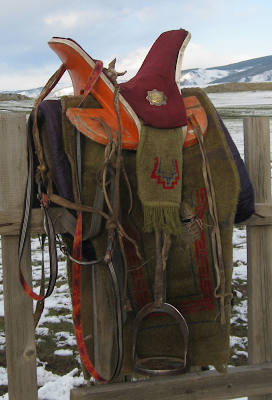While is hasn't been obvious in anything I've posted, there is going to be a shaman as a main character in that story. In an effort to avoid Mikado-fail*, I am doing as much research as I am able to on the traditions, practices and culture of the people of Mongolia and the Mongol Empires (which are not necessarily the same thing). Because I want to tell (as much as it is possible for any outsider) a story of Mongolia, not a Western story
set in Mongolia. I may fail at this. I know that I will get some things wrong, because I am human, and because the only way to even begin to fully learn a culture is to go and live among it, which is not an option for me. But I am going to do my best.
Mikado-fail:
 |
| Gilbert and Sullivan took a quintessentially
English story and characters, put it in a pseudo-Japanese setting, and
created Japanese sounding nonsense words for their characters to use. It is a
fun play, but a good example of what not to do when using another culture for inspiration. To be fair, G&S probably did the best they could with the info available to them. |
Some of my research has been less into Mongolia and more into steampunk. I love steampunk, but I'm new to it. I'm also not good at visualizing how something might look. So I take advantage of the amazing folks who have been doing steampunk for years before I knew steampunk existed, and use the creations and re-imaginings I find on the web as visual inspiration for how steampunk technology and ideas might fit in with Mongolian culture and esthetic.
Partly for this research, and partly just out of curiosity, I googled 'Steampunk Shaman' to see what re-imaginings others might have come up with.
Which is how I stumbled on the massive argument over steampunk, cultural appropriation and the word 'Shaman' that broke out this past April.
Here are a few links, for anyone interested in the original kerfluffle:
http://alisonleighlilly.com/blog/2012/the-gears-of-chance-steampunk-magic/
http://jhameia.tumblr.com/post/20469090120/the-gears-of-chance-steampunk-magic
http://alisonleighlilly.com/blog/2012/steampunk-shamanism-cultural-appropriation/
http://thegreenwolf.tumblr.com/post/20476737012/the-gears-of-chance-steampunk-magic
Which got me thinking in several different directions.
My Character
A few comments in that debate mention the origin of the word 'shaman' being a tribe in Siberia. A smaller number mention the Turgic tribe that anthropologists originally learned the word from. I say it that way because as far as I can find in my research, the languages of the tribes in that region were very similar, and the word 'shaman' was used in several if not all of them, rather like the word 'priest' can be found in America, England and Australia, and none of those countries has sole claim on the word.
I spent some time trying to track down what relationship, if any, there is between the tribes the word 'shaman' came from and the Mongols (which is difficult as 'Mongol' can apply both to a specific groups of tribes or all the tribes which united under Gengis [Chinggis] Khan to form the Mongol Empire). What I have found is that modern shamans in Mongolia and Siberia (and the distinction between the two is not hard and fast, especially culturally, however clear it may be nationally) refer to themselves as shamans, and reference shamans as being part of the Mongol armies, as well as having important diplomatic functions in the Mongol Empire.
So I am comfortable using the word 'shaman' for my character. And yes, I did all this research before finding the above mentioned kerfluffle.
Cultural Assimilation and Writing Fiction
I am going to try and address this topic and how it relates to fiction and fantasy writing. At the same time, I do recognize how offensive many people of other cultures find it when idiots from the culture that destroyed theirs go around cherry picking beliefs and traditions for whatever reason. There is, unfortunately, a difference between A) recognizing your privileged position, B) being aware of your privileged attitudes and C) avoiding being offensive. So, I have A down, I am working on B, and for C I need to rely on other people to tell me if I screw up. Please accept my intention to deal with this topic respectfully and feel free to point out any attitudes of privilege or offense that I am unaware of so I can bloody well learn from my mistakes.
Cultural assimilation is a fact of human existence. I'm not referring to the wholesale culture-stealing of Victorian and Edwardian England (which is an historical fact), but of the way cultural assimilation has been going on since the beginning of recorded history (actually, since before then, but I'll stick with historical examples). Anyone out there familiar with the fun Hanukkah story about he band of brothers who overthrew the evil overlords forbidding them to follow Jewish traditions? Here's a part of the story you probably hadn't heard - those evil overlords weren't the usual conquerors that had been overrunning the kingdom of Israel every other book of the Tanakh (that would be Old Testament for the goyim out there). The evil overlords in the story of Maccabeus were
Jews who had assimilated Greek culture, and wanted to force everyone else to do the same.
 |
| Cultural assimilation in your living room. |
The examples of this are endless.
- Mongolian hairstyles becoming the fashion for the courtiers of Korea,
- Japan 'stealing' from China lock, tea and writing system.
- China adopting religion and culture from India.
- Half the words of the English language.
- Fusion cuisine. 'Nuff said.
- Christianity - beliefs from Judaism, holidays from pagans and the Catholic Mass came from the Romans
- Speaking of Romans, how about Rome assimilating the gods of every frigging people they ever conquered.
Personally, I think one of the craziest examples of 'cultural assimilation' ever would be the Vikings raiding monasteries for monks. They burned the monasteries (and their libraries) down and then sold the monks as slaves to Norse nobles who wanted to learn Christianity. (We're going to burn all your books, drag you home, and force you to teach us what was in those books. Right, that's perfectly rational.) On the other hand, we're talking humans. Someone, somewhere, has surely done something crazier. (And if you find it, please send me a link!)
The point here is not that cultural assimilation is necessarily good or bad. The point is that it can't be stopped. Until and unless all humanity has one single homogenous culture (and if you believe that is possible, I've got a great piece of lunar cubage to sell you - half off this week!)
cultural assimilation will always happen. When people meet they exchange ideas, they change each other, and each becomes something different, something new. This is true on the scale of individuals, communities and cultures.
If you write fiction in any setting other than your hometown, and even if you don't, you will one day come across an idea, a tradition, a myth, a fashion, from another culture and go 'Oh! I love that. I wonder if I can use it in a story.' On the surface, there is nothing wrong with this. It is inspiration, it is creativity, and it is wonderful, but...
It is also part of someone's culture. A connection with their ancestors, a sacred trust, a reminder of their past, a treasured memory from their childhood. And I really hope that no one reading this blog has any desire to be a literary graverobber; a modern re-creator of Victorian mummy-opening parties, with no consideration or concern for the people we use for our entertainment.
I'm not saying you shouldn't use those inspirations and ideas. I am saying, be thoughtful. Be respectful. Try and understand how the idea fits with in its culture. Don't take sacred imagery and use it to create your villian. Don't make a mockery of a treasured myth. If you can, try and talk with someone from that culture.
I'm saying that other people, other cultures, and their beliefs and traditions don't exist for our entertainment and shouldn't be used as entertainment. If you want to use a tradition, an idea, a myth, use it because you think it is a wonderful idea that is worth sharing, use it because it touches you and changes you. Because you think it will touch others.
Seriously, there is nothing wrong with being inspired by another culture. Creativity is fed on new ideas. But by all that is holy remember that it is
not your culture. Think of how someone from that culture might feel about your portrayal. Remember that while US and European artistic tradition has made mocking everything sacred something we expect, many other cultures do not share or appreciate that kind of attitude. Hell many Americans get pretty twisted out of shape about
other Americans mocking/misrepresenting/etc American culture. Now think about how people who have been shat on for years by Americans and Europeans will feel about having their culture misrepresented, mocked or desecrated? So don't do those things - be respectful.
Okay, ranting aside, some practicalities. How do we go about being respectful of the cultures that inspire us and whose ideas and traditions we want to include in our writing?
I don't claim to have all the answers, but here are a few thoughts:
- Language - If my story wasn't set in Mongolia, I wouldn't be calling my character a shaman. I would use what ever term he would have called himself. It doesn't matter how similar you think the traditions of this tribe from North America are to that tribe from Africa - don't stick the names and terminology of one people onto another people.
- Do your research - the factoids floating around the internet and pop culture are rarely reliable. Dig up historical sources, articles and information written by the people of that culture today. Check out Project Gutenberg. They have thousands of free files of historical source material.
- Be true to the tradition - So you want to break away from the Norse-based fantasy world Tolkien popularized? Great, go for it. But remember that part of why what Tolkien did worked was that he knew the original myths and was true to them within the bounds of his creation. Did he take a lot of artistic license? Hell yeah. Are his elves and dwarves recognizable as the creatures of Norse traditions? Also hell yeah (or should I say Hel yeah?)
 |
| Hel: Misused and ticked off about it since the first millenium |
- Want to explore the Leopard shapeshifters of Africa? Don't just apply lycanthropy to leopards, see what you can find in your local library systems myth and folklore sections. Those buggers are scary.
- Like the old Val Kilmer movie "The Ghost and the Darkness"? Do your research, and you might find that the people who lived there thought the lions were Kings in lion shape trying to stop the invaders. (no, I don't know if the info on Wikipedia is accurate - would be very grateful to anyone who can confirm)
- Is there a myth that you think would make a wonderful fantasy novel? Find as many original sources for the myth as you can. Learn the way the myth varies between local cultures and tribes. If you are going to change it out of recognition - change the names and don't claim it is the same myth. If you are trying to stay true to the original, acknowledge your sources, keep it culturally appropriate.
Alright, this has run on long enough, so I'll wrap up here. If you're interested, Monday I'm going to be taking a look at cultural exploitation, and cultural paternalism; and how all of they are giving assimilation a bad rap.
In the mean time, do you have any thoughts on ways that ideas and traditions from other cultures can inspire and/or become part of the stories we tell without being offensive to the original culture? If you do, please share them in a comment.
 Weregeek
Weregeek













